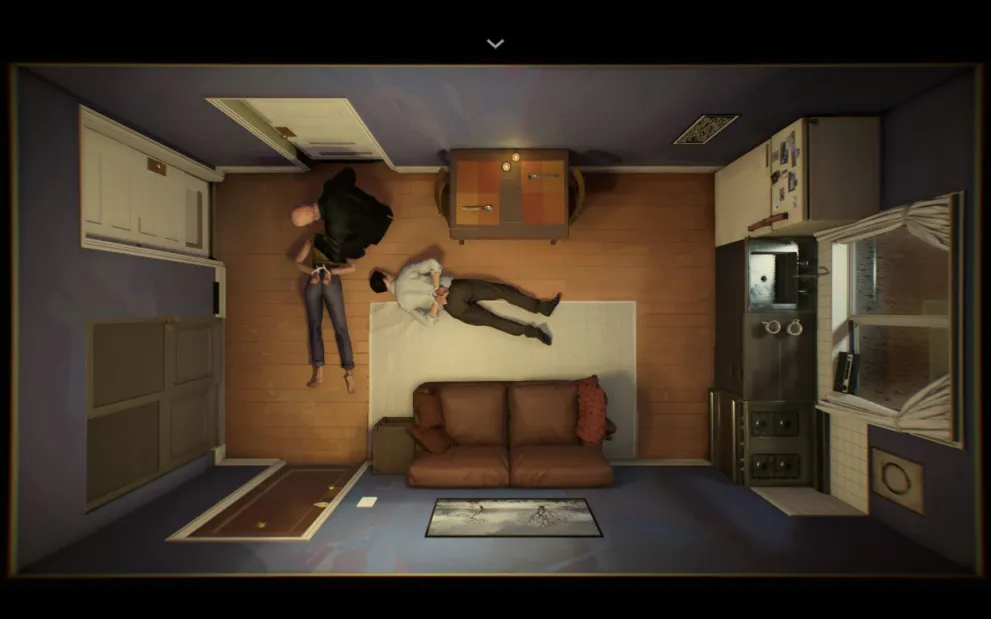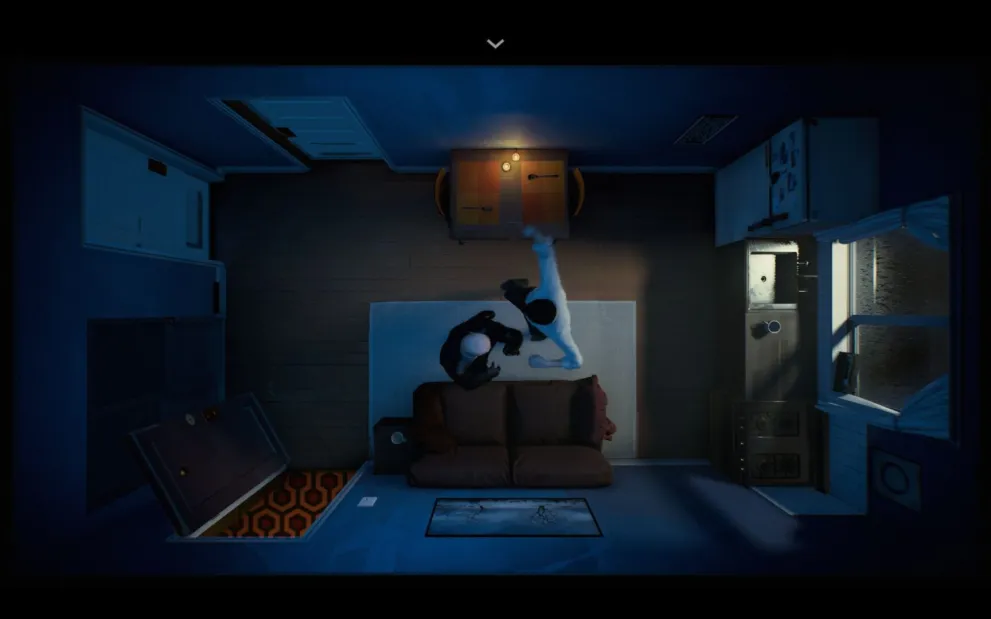Twelve Minutes on PC
The man comes home from work. He opens the door to his apartment, his wife emerges from the bathroom and greets him, saying she didn’t hear him come in. She says she’s prepared dessert for that night, the man tells her he’ll let her know when he’s ready to eat. He spies a knife on the kitchen counter and briefly contemplates stabbing his wife. There’s no coming back from this, he thinks to himself. If he does this, he’s a murderer. He puts the knife away, but then picks it back up again and stabs her. Slightly surprised at what he’s done, he calls emergency services with his wife’s cell phone. A few minutes later, a cop shows up to subdue him, and the man takes a punch to the face.
Then, he comes home from work.
Twelve Minutes is made up of a series of time loops with various events that will always occur in a set order. The evening always starts with the man coming home from work, there’s always dessert, there’s always a storm, and there’s always that damn cop who shows up at your door whether you like it or not. Those are constants that can’t be changed, but you can change how you react to them.
During my very first loop, I was curious to see just how much freedom the game was willing to give me, and I ended up stabbing the wife during that same run. Without any context for the story whatsoever –no setup, no introduction to the time loop or its characters, nothing– it was clear that the game was content in letting me shape the man’s evenings in any way I wanted.
That is both the greatest strength and greatest weakness of Twelve Minutes. Aside from a few key lines of dialogue that will attempt to give you some vague hints as to what to do next, the game is largely directionless. You can interact with almost every single object in your little apartment, in whatever order you want, and it could lead to new revelations in the story… or it might not, and you’ll have wasted your time and need to restart the loop to try something else.
Here’s the setup, with minimal story spoilers: you play an unnamed man who’s coming home from work. His wife’s prepared dessert especially for that evening, and she announces that she’s pregnant. However, before you have any time to celebrate the good news, a man claiming to be a cop shows up and says you’re both under arrest. He accuses the wife of committing murder, and things usually go downhill from there. The time loop resets whenever 12 minutes are up, or if the man gets killed or beaten up.

Once you’ve seen the order of events, it’s up to you to figure out the mystery of the cop and your wife’s history and try to figure out a way out of this whole mess.
The entire game is a puzzle box, and the apartment contains all the pieces you need to solve it. The great thing about Twelve Minutes is that the man is quick to realize that he’s in a time loop and needs to figure out a way to break out of it. There’s no unnecessary exposition here, no lengthy cutscene of him bemoaning his situation and explaining to the player what’s happening and what needs to be done, it just is. He retains all information he got from his previous loop, and will be able to use that info to his advantage in subsequent loops whether it’s through conversation with the wife, or thinking to search an area in the house he hadn’t paid attention to before.
There’s no wasted dialogue here. Everything is precise and to the point, and (almost) everything has a purpose. Once you’ve got a vague sense of what you need to do, Twelve Minutes becomes a matter of execution. You’ll need to figure out what order to do things in, what cues to look out for. It’s not quite as punishing as something like Broken Age, where the puzzles and event order could get really complex and frustrating at times.
It’s more akin to something like Ghost Trick, where the cues are all laid out in front of you clearly, and if you make a mistake, it doesn’t take that much time to reset the loop and try again. Just walk out the front door, and the man will be right back where he started.
The frustration of Twelve Minutes lies in actually figuring out what to do. Look, I’ll be the first to admit that I can be pretty obtuse when it comes to puzzle games, but let this be a warning to anyone who might be in the same boat as me.
Twelve Minutes doesn’t hold your hand at all, which is a good thing, but that also means that the game can be pretty vague and unhelpful if you’re ever stuck on what to do next. There were a couple of times where I’d felt like I had exhausted every single option available to me and that the game was absolutely stonewalling me. It felt impossible to see which pieces had to go where in which specific scenario, and that can be frustrating. The second time this happened, I was just about ready to give up for the day when I stumbled upon the solution by complete accident and finally made progress in the mystery.
Of course, savvier players than me should have less of an issue figuring out Twelve Minutes’ puzzle box, especially since the solution seemed so incredibly obvious after I finally chanced upon it. But if you’re not particularly adept at solving environmental puzzles, be warned.
Despite my personal frustrations with the game, though, I found myself constantly thinking about Twelve Minutes any time I wasn’t actually playing it. The setup seems so simple, yet the mystery is so damn tantalizing. Each time you make a breakthrough in the mystery and feel like you might be one step closer to unraveling the whole thing, Twelve Minutes pulls the rug out from under your feet and makes you question everything you’ve learned so far.

The scope of the mystery is far bigger and more complex than you initially think, but Twelve Minutes is so well-paced and masterful in how it doles out new info to the player that it never feels overwhelming. It also never overstays its welcome; my playthrough took around seven hours, and that includes all the time I spent faffing around and beating my head against the wall while trying to figure out how to progress. It’s a short but impactful game that’s left me reeling days after I’ve completed it.
And of course, props must be given to the three actors that breathe life into the tiny cast of Twelve Minutes. Willem Dafoe is incredibly menacing and terrifying as the violent cop who barges into your apartment, and every second with him onscreen feels Really Fucking Intense. The cop isn’t someone you can fight head-on, which makes every interaction with him feel deadly and very high stakes. Dafoe’s iconic voice just adds to that tension and dials it up to 11.
On the flip side, James McAvoy and Daisy Ridley voice the man and the wife, and they deliver powerful, vulnerable performances that make the characters feel like actual people. Considering that Twelve Minutes uses a top-down perspective, you never get to see the characters’ faces or any type of facial expression they might have. It’s the voice work that does the heavy lifting here, and it definitely sticks the landing. McAvoy’s voice trembles at each big story revelation, and Ridley matches his vulnerability with a tone of weakness that signals just how defeated the wife feels.
The actors are the heart of Twelve Minutes, and while the story itself is compelling in its own right, the game wouldn’t be half as powerful as it is without its cast breathing life into the characters.
Twelve Minutes is bold in its artistic choices in every aspect of the game. From the top-down camera perspective to the deliberate lack of instruction from the very beginning, Twelve Minutes wants you to figure everything out for yourself and see just how deep the rabbit hole goes. There are drawbacks to this, as exemplified by my own shortcomings when it comes to puzzle games, but it’s also elegant in its simplicity and minimalism. Twelve Minutes is a deliberately introspective game that doesn’t waste its breath on unnecessary exposition or dialogue. Wanting to see all it has to offer may take some effort on the player’s part, but it’s well worth the hard work and investment.
- The voice cast is excellent and breathes life into the game and characters.
- The mystery is so damn tantalizing.
- Time loops are easy to reset, and the game gives you the freedom to experiment with basically anything you want.
- No cumbersome tutorials or needlessly long cutscenes to explain basic mechanics to the player.
- Run time is fairly short, which makes the story feel precise and powerful.
- The game can be a little vague with its hints, which can lead to frustration for players who aren't good at puzzle games.













Updated: Aug 17, 2021 12:05 pm